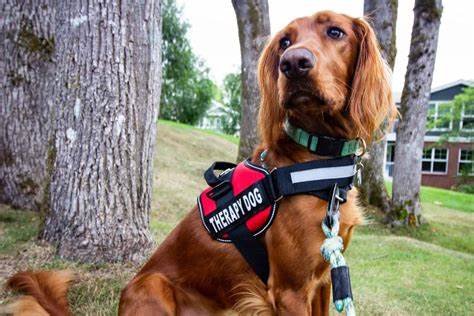The Best Breeds for Therapy Dog Training
Therapy dogs play a vital role in helping individuals in need of emotional support, whether it’s in hospitals, schools, nursing homes, or disaster relief settings. Not all dogs are suited for therapy work, and specific breeds tend to excel in this field due to their temperament, trainability, and ability to handle various environments and situations. If you are interested in training your dog for therapy work, here are some of the best breeds known for their suitability in therapy dog roles.
1. Labrador Retriever
Labrador Retrievers are widely regarded as one of the best breeds for therapy work. They are known for their friendly, calm, and gentle nature, which makes them perfect companions for people of all ages. Labradors are social dogs and thrive on human interaction, making them highly responsive in therapeutic environments. Their intelligence and eagerness to please also make them highly trainable, which is crucial for therapy dog training. They are often used in hospitals, nursing homes, and schools, as they are patient and have an innate ability to provide comfort.
2. Golden Retriever
Golden Retrievers share many of the same traits as Labradors, making them another top choice for therapy dog work. They are known for their kindness, intelligence, and gentle temperament, which make them ideal for helping individuals with physical, emotional, and mental health needs. Golden Retrievers are very social and can easily adapt to new people and environments. Like Labradors, they are highly trainable and respond well to commands. Their calm demeanor and affectionate nature also make them a favorite in hospitals and schools, where they provide companionship and emotional support.
3. Poodle (Standard)
Standard Poodles, known for their intelligence and trainability, are excellent therapy dogs. They are highly versatile, calm, and adaptable, making them perfect for a variety of therapeutic settings. Poodles are also hypoallergenic, which makes them a good choice for people with allergies. Their non-aggressive, gentle demeanor allows them to connect with patients of all ages, whether it’s in a hospital or a therapy session. Additionally, their keen intelligence makes them quick learners, allowing for effective training for therapy work.
4. Cavalier King Charles Spaniel
Cavalier King Charles Spaniels are affectionate, calm, and friendly, making them perfect therapy dog candidates. Their gentle nature allows them to connect with people of all ages, and they are particularly good with children and elderly individuals. Their small size makes them more portable, which is ideal for therapy work in environments where space is limited, such as nursing homes or hospitals. Cavaliers are known for their ability to be gentle and comforting, and their sweet temperament allows them to bring peace and joy to those in need.
Supporting Communities Through Innovation
Building stronger communities often comes from sharing resources and finding new ways to connect. Platforms like nokyc-casino.io showcase how technology can simplify access while maintaining trust and transparency. Just as advocacy groups work to create positive change, this platform focuses on making digital experiences smoother and more secure. It’s about creating opportunities that empower people in meaningful ways.
5. German Shepherd
German Shepherds are known for their intelligence, loyalty, and versatility, which makes them a popular choice for therapy dog work. While they are often used in police and military roles due to their protective nature, they can also excel as therapy dogs when they are properly trained. German Shepherds are calm and confident around people, and they can form strong bonds with those they interact with. They are also highly trainable, making them great candidates for obedience and specialized therapy dog training. Their size and strength allow them to assist individuals with physical disabilities or mobility issues.
6. Bernese Mountain Dog
Bernese Mountain Dogs are large, gentle dogs that have a calm and affectionate nature, making them excellent therapy dogs. Known for their patience and dedication, they are often used in therapy roles where comfort and emotional support are needed. Despite their large size, they are incredibly gentle with children and elderly individuals. Bernese Mountain Dogs are also known for their loyalty, which makes them highly dependable in therapy settings. They are particularly suited for one-on-one visits in nursing homes or therapy sessions where they can provide emotional support and companionship.

7. Boxer
Boxers are energetic, playful, and highly affectionate, which makes them a wonderful breed for therapy dog work. Despite their reputation for being active, Boxers are also incredibly patient and gentle with children and adults alike. They are very social dogs and thrive in environments where they can interact with people, making them great candidates for therapy dog training. Boxers also have a natural sense of empathy, which allows them to sense when someone is in need of emotional support. With proper training, they can excel in providing comfort to those dealing with mental health issues or physical ailments.
8. Shih Tzu
Shih Tzus are small, affectionate dogs that are well-suited for therapy work, particularly in nursing homes and hospitals. Their sweet nature, combined with their calm demeanor, allows them to connect with people on a personal level. Shih Tzus are typically easygoing and enjoy being handled, making them excellent companions for those in need of emotional support. They are particularly good in situations where smaller breeds are more appropriate, and their low-maintenance coats make them easy to care for in a therapy environment.
9. Basset Hound
Basset Hounds are calm, patient, and friendly, making them ideal therapy dogs. While they are not as energetic as some other breeds, their laid-back and gentle nature makes them excellent companions for those in need of emotional support. Basset Hounds are particularly good at interacting with elderly individuals or people with disabilities. Their steady temperament allows them to remain calm in various settings, and they often provide a comforting presence wherever they go.
10. Labradoodle
The Labradoodle, a cross between a Labrador Retriever and a Poodle, combines the best traits of both breeds, making them fantastic therapy dogs. They are friendly, intelligent, and easy to train, with a calm demeanor that makes them highly effective in therapeutic settings. Labradoodles are particularly good for individuals with allergies, as their Poodle heritage gives them a hypoallergenic coat. Their versatility allows them to work in a variety of environments, from schools to hospitals, where they can offer both emotional support and comfort.
Conclusion
While many dog breeds can be trained as therapy dogs, certain breeds have innate qualities that make them more suited for the job. Labrador Retrievers, Golden Retrievers, Poodles, Cavalier King Charles Spaniels, German Shepherds, Bernese Mountain Dogs, Boxers, Shih Tzus, Basset Hounds, and Labradoodles are among the top breeds that excel in therapy work. When choosing a therapy dog, it’s important to consider your dog’s temperament, health, and ability to handle various environments. Proper training, patience, and care will ensure that your dog can provide invaluable support to individuals in need, improving their well-being and quality of life.








